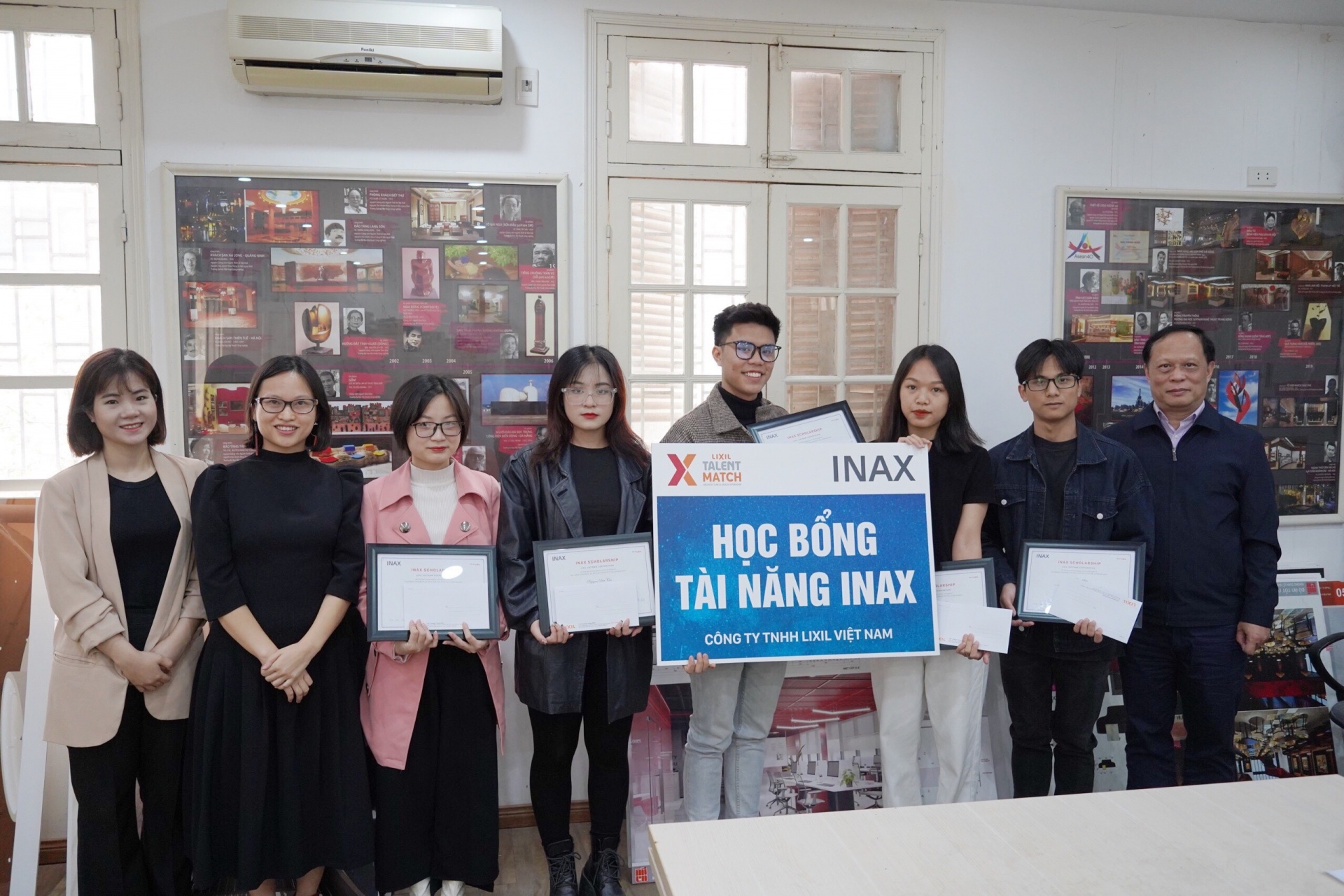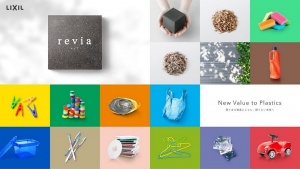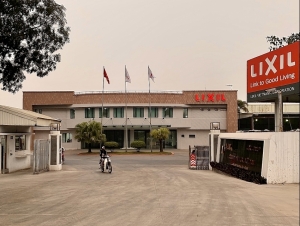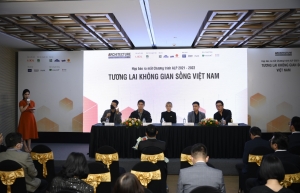LIXIL embraces cleaner future
 |
| Toshie Takahashi, leader of Brand and Commercial Marketing for Vietnam(left) and Priyanka Tanwar, leader of Communications and Corporate Responsibility for Asia at LIXIL |
Can you share some information about LIXIL's corporate responsibility (CR) strategy?
Tanwar: LIXIL’s CR Strategy outlines three core pillars of activity, representing the most pressing global issues relevant to our business. These include global sanitation and hygiene, water conservation and environmental sustainability, and diversity and inclusion.
To drive positive change in each area, we are leveraging our expertise and business scale to pursue responsible and sustainable innovation to develop safe and convenient products and services. By being committed to this strategy, we aim to achieve LIXIL’s purpose to make better homes a reality for everyone, everywhere.
Regarding sanitation and hygiene, even today, more than 2.3 billion people around the world do not have access to safe sanitation and drinking water. As the world's largest water technology company, it's our responsibility to not only conserve water through our products, but also constantly come up with innovative ways to treat grey water and manage human waste. Through our power brands, American Standard, GROHE, and INAX, LIXIL touches the lives of over one billion people every day.
We are also engaging communities in less developed countries with our SATO brand, which offers the low-cost SATO Toilet and SATO Tap solutions at less than $5, which can be provided to consumers who have either never used a washroom before or do not have access to indoor plumbing.
As for water conservation and environmental sustainability, almost all of our products and technologies are designed with water conservation in mind. An example would be our EasySET technology, which allows you to preset water pressure and temperature. In this way, you don't have to waste 30 seconds of running water to adjust the water temperature, which happens a lot when you are in someone else's house or in a hotel.
Another example is our Double Vortex flushing system, which will almost ensure that you never need to flush a second time with any LIXIL product. From an aesthetic angle, with innovations like our Aqua Ceramic, the amount of cleaning products you need to operate and maintain the washrooms in your home is greatly reduced.
As a company, we have set a climate goal called Environmental Vision 2050, meaning in all of our areas of business (manufacturing, sales, commercial offices, and supply chain), we aim to be net-zero in terms of CO2 emissions. We are delighted to share that all our fitting plants, within LIXIL International outside of Japan, are already carbon-neutral.
Diversity and inclusion is our third CR pillar. If you observe the American Standard collection, you will notice that it not only caters to well-to-do consumers, but is also accessible to consumer groups with different needs, like the elderly and children. Refinements, such as the small seats in the bathroom, help the elderly to make themselves more comfortable and are an expression of our efforts to cater to all consumer groups.
What has shifted in the behaviours of Asian consumers post-pandemic, and how does LIXIL fill this new demand?
Tanwar: Change is difficult. But ultimately, it always presents an opportunity. The pandemic has forced almost everyone to use their homes as a multifunctional space. From what was typically a place to rest or be with family has suddenly transformed to a space to host all your meetings, leisure activities, or even staycation holidays. Consumers started to realise that the home is actually a space where they should and must invest more, and the income that would have typically gone for a holiday or consumer luxuries is now spent on home renovations to make their living spaces more comfortable.
For LIXIL, we understand that this rising demand also means more focus on quality and other aspects regarding hygiene and health. In the bathroom, consumers want to touch less to avoid cross contamination, so antibacterial finishes and sensor taps are now available for homes, not just in airports, shopping malls, or other high-traffic areas. In hard-to-reach communities, our SATO toilet solutions and taps mentioned above are another example of our efforts to protect consumers from infectious diseases.
Do you observe a shift towards green initiatives in consumer trends? If not, what is LIXIL doing to educate the market?
Tanwar: Yes, there's definitely a change, especially in Asia-Pacific. Five years ago, we thought we knew climate change was happening, but we were not convinced that we had anything to do with it directly. Today, I can see a lot more consumer and business conversations and awareness around sustainability compared to five years ago.
Asian consumers typically spend a lot of time on their mobile phones and are completely clued in on all the global trends. They now want to buy from companies that are responsible, and the idea of circular living is now taken very seriously.
So, whether you look at segregation of waste, water saving and conservation, or getting used to words like carbon neutrality and reduction in your carbon footprint, there is now a lot of awareness, conversation, and action.
For LIXIL, the heart of our purpose is sustainable growth, and making better homes a reality for everyone, everywhere. We believe in a circular economy, and actively apply a Cradle-to-Cradle approach, which makes new products from the old ones at the end of their useful life. Currently, there are six LIXIL products which are already Cradle-to-Cradle certified, which means the product lifecycle is no longer linear in a source-make-waste cycle.
As for packaging, we now use recycled paper or corrugated materials, which are themselves 95 per cent recyclable. After you dispose of the packaging and install your product, the packaging itself gets further recycled. Are consumers completely aware of these solutions in the market? No, but the important thing is they now have an option to buy from companies like us who are making these products.
Sometimes we help consumers save without them realising it. For example, the lock and water lock systems in our faucets help our consumers save up to 35 per cent of their water consumption just from those last droplets that leak as you switch it off. These are some of the ways in which we enable consumers to be more responsible.
Could you share several of LIXIL’s outstanding community support activities in Vietnam and Asia-Pacific?
Takahashi: During the pandemic, public hospitals in Vietnam were usually at full capacity and faced high risk of cross-infection. Their current facilities were challenged to meet the sudden surge in demand for basic hygiene like handwashing. We discussed with some of the key hospitals and decided to provide them with portable washing stations, which was possible because hospitals could tap into the built-in pipes underground. After only a short time of operation, our stations were quickly proven effective and were used by medical staff and patients' families.
Another notable initiative is the LIXIL Talent Match, which provides opportunities for students to connect with professional architects. This can be in the form of a scholarship, an internship, or sometimes simply a seminar.
The programme was created based on the model of community synergies, in which LIXIL Vietnam plays the role of a facilitator between universities, design companies, and architectural consultancies to create a comprehensive ecosystem. Through this connection, we aim for a higher goal of promoting the development of the younger generation of Vietnamese designers and architects through activities that link theory with practice.
 |
| The LIXIL Talent Match programme provides opportunities for students to connect with professional architects |
Tanwar: In addition to what we are doing in Vietnam, every market in Asia has its own initiative. In India and the Philippines, we have plumber training programmes, enabling them to become more proficient in their craft and uplifting plumbing as a profession with more economic benefits.
In Indonesia, we partnered with a startup called Jamban.id, where “jamban” literally means “toilet” in Bahasa Indonesia. With their data tracking, we are renovating public toilets across Indonesia, making such facilities cleaner, more water-efficient, and easier to operate and maintain for visitors and the local community.
Some other fun and shorter-term initiatives include an annual community day in Singapore, where people join a marathon and do beach clean-ups.
How does the new American Standard global brand identity launch tie in with LIXIL's overall CR strategy?
Tanwar: All LIXIL brands are aligned with our three CR pillars, which I mentioned earlier. These pillars are part of the core DNA in all LIXIL products. Any new collection from our brands will continue to support water conservation. All new collections from American Standard will now come in sustainable packaging, which signifies our tremendous efforts, as ceramic products like toilet bowls are not easy to ship. All in all, the American Standard new brand identity is completely aligned with LIXIL's CR initiatives, and more products will continue to be designed and sustainably produced.
Furthermore, American Standard faucets and showers are now being made in facilities which are carbon-neutral (all of LIXIL International’s fittings plants are carbon-neutral), including one in Danang. As the Vietnamese government is aiming for net-zero by 2050, we have aligned our own CR goals with the government’s net-zero carbon emissions objective.
Wherever LIXIL operates, we follow all government regulations and initiatives, but of course, we strive to do more than that. LIXIL’s Zero Carbon and Circular Living policy aims to reduce CO2 emissions from our business processes, products, and services to become net-zero by 2050. Our goal is to be a leader in the field of preserving water and limited resources for future generations.
 | LIXIL introduces revia – a circular material born from waste plastic and wood LIXIL Corporation, a maker of pioneering water and housing products, has introduced revia, which combines waste plastic and wood to create a suitable material for a wide range of applications. |
 | Smart sanitation for 21st century living In the context of the Fourth Industrial Revolution, “smart living” is present in every corner of the house, even the toilets, thus “smart sanitary ware” is no longer an obscure peculiarity. Holding this trend, manufacturers have been rolling out innovative solutions and technologies that enable the sustainable usage of water and bring back "Good living" for all, including Vietnam. |
 | Seeking solutions for the future of Vietnamese living spaces The Architecture Leader Perspective (ALP) for 2021-2022 on the future of Vietnamese living space made its debut on March 31 in Hanoi to find innovative solutions to the problems facing contemporary architecture. |
What the stars mean:
★ Poor ★ ★ Promising ★★★ Good ★★★★ Very good ★★★★★ Exceptional
Related Contents
Latest News
More News
- Bac Ai Pumped Storage Hydropower Plant to enter peak construction phase (January 27, 2026 | 08:00)
- ASEAN could scale up sustainable aviation fuel by 2050 (January 24, 2026 | 10:19)
- 64,000 hectares of sea allocated for offshore wind surveys (January 22, 2026 | 20:23)
- EVN secures financing for Quang Trach II LNG power plant (January 17, 2026 | 15:55)
- PC1 teams up with DENZAI on regional wind projects (January 16, 2026 | 21:18)
- Innovation and ESG practices drive green transition in the digital era (January 16, 2026 | 16:51)
- Bac Ai hydropower works stay on track despite holiday period (January 16, 2026 | 16:19)
- Fugro extends MoU with PTSC G&S to support offshore wind growth (January 14, 2026 | 15:59)
- Pacifico Energy starts commercial operations at Sunpro Wind Farm in Mekong Delta (January 12, 2026 | 14:01)
- Honda launches electric two-wheeler, expands charging infrastructure (January 12, 2026 | 14:00)

 Tag:
Tag:




















 Mobile Version
Mobile Version